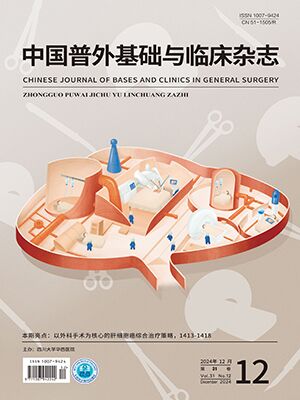Objective To study the expression of proliferating cell nuclear antigen (PCNA) in the occurrence and development of hepatocellular carcinoma.
Methods Sixty SD rats were randomly divided into control group and experimental group. 3′MeDAB was administrated into rats to establish the experimental model of hepatocarcinoma. The expressions of PCNA of different phases were detected by immunohistochemistry and the liver pathologic changes were observed by optical microscope.
Results The process of canceration was divided into three stages: inflammation, proliferative fibrosis and hepatic carcinoma. The expression of PCNA firstly presented in the oval cells that located in the portal area at the stage of inflammation, and a part of PCNA were hyperexpressed in the portal area. The expression rate of PCNA in the middle phase of inflammatory stage was higher than that of any other phases but declined later. Yet, when it came to the stage of hepatic carcinoma, the rate increased again.
Conclusion Under the experimental circumstance when liver cancer is caused by the carcinogenic agent, PCNA may be firstly expressed in the oval cells, and the dynamic expression of PCNA may be an indicator for the early diagnosis of hepatocarcinogenesis.
Citation: GONG Jiaqing,FANG Chihua. Study on Dynamic Expression of Hepatic Proliferating Cell Nuclear Antigen in The Occurrence and Development of Hepatocellular Carcinoma. CHINESE JOURNAL OF BASES AND CLINICS IN GENERAL SURGERY, 2007, 14(1): 11-14. doi: Copy
Copyright © the editorial department of CHINESE JOURNAL OF BASES AND CLINICS IN GENERAL SURGERY of West China Medical Publisher. All rights reserved




